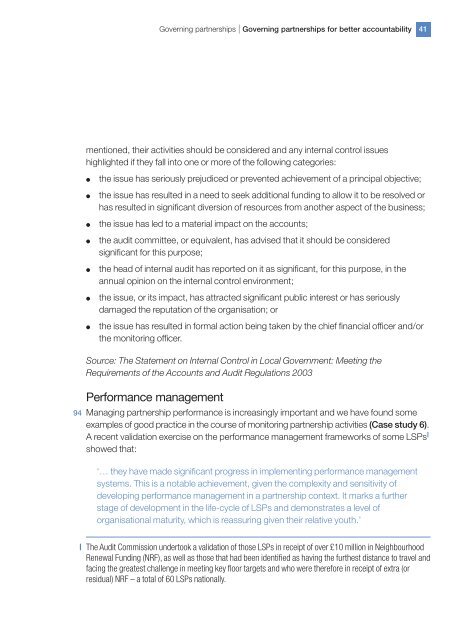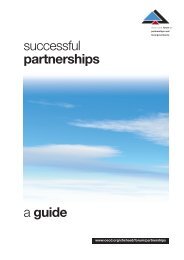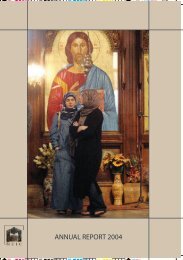Bridging the accountability gap - Audit Commission
Bridging the accountability gap - Audit Commission
Bridging the accountability gap - Audit Commission
You also want an ePaper? Increase the reach of your titles
YUMPU automatically turns print PDFs into web optimized ePapers that Google loves.
Governing partnerships | Governing partnerships for better <strong>accountability</strong> 41<br />
mentioned, <strong>the</strong>ir activities should be considered and any internal control issues<br />
highlighted if <strong>the</strong>y fall into one or more of <strong>the</strong> following categories:<br />
●<br />
●<br />
●<br />
●<br />
●<br />
●<br />
●<br />
<strong>the</strong> issue has seriously prejudiced or prevented achievement of a principal objective;<br />
<strong>the</strong> issue has resulted in a need to seek additional funding to allow it to be resolved or<br />
has resulted in significant diversion of resources from ano<strong>the</strong>r aspect of <strong>the</strong> business;<br />
<strong>the</strong> issue has led to a material impact on <strong>the</strong> accounts;<br />
<strong>the</strong> audit committee, or equivalent, has advised that it should be considered<br />
significant for this purpose;<br />
<strong>the</strong> head of internal audit has reported on it as significant, for this purpose, in <strong>the</strong><br />
annual opinion on <strong>the</strong> internal control environment;<br />
<strong>the</strong> issue, or its impact, has attracted significant public interest or has seriously<br />
damaged <strong>the</strong> reputation of <strong>the</strong> organisation; or<br />
<strong>the</strong> issue has resulted in formal action being taken by <strong>the</strong> chief financial officer and/or<br />
<strong>the</strong> monitoring officer.<br />
Source: The Statement on Internal Control in Local Government: Meeting <strong>the</strong><br />
Requirements of <strong>the</strong> Accounts and <strong>Audit</strong> Regulations 2003<br />
Performance management<br />
94 Managing partnership performance is increasingly important and we have found some<br />
examples of good practice in <strong>the</strong> course of monitoring partnership activities (Case study 6).<br />
A recent validation exercise on <strong>the</strong> performance management frameworks of some LSPs I<br />
showed that:<br />
‘… <strong>the</strong>y have made significant progress in implementing performance management<br />
systems. This is a notable achievement, given <strong>the</strong> complexity and sensitivity of<br />
developing performance management in a partnership context. It marks a fur<strong>the</strong>r<br />
stage of development in <strong>the</strong> life-cycle of LSPs and demonstrates a level of<br />
organisational maturity, which is reassuring given <strong>the</strong>ir relative youth.’<br />
I The <strong>Audit</strong> <strong>Commission</strong> undertook a validation of those LSPs in receipt of over £10 million in Neighbourhood<br />
Renewal Funding (NRF), as well as those that had been identified as having <strong>the</strong> fur<strong>the</strong>st distance to travel and<br />
facing <strong>the</strong> greatest challenge in meeting key floor targets and who were <strong>the</strong>refore in receipt of extra (or<br />
residual) NRF – a total of 60 LSPs nationally.








